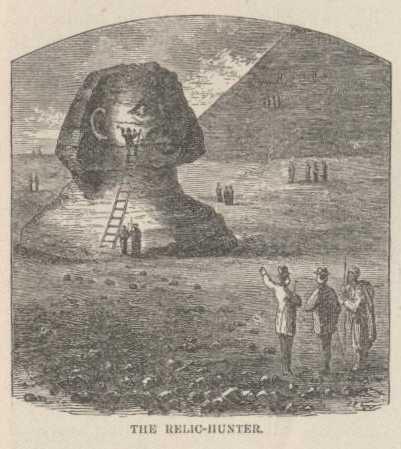Quaker City Makes Port in Alexandria:
After a pleasant voyage and a good rest, we drew near to Egypt and out of the mellowest of sunsets we saw the domes and minarets of Alexandria rise into view. As soon as the anchor was down, Jack and I got a boat and went ashore. It was night by this time, and the other passengers were content to remain at home and visit ancient Egypt after breakfast. It was the way they did at Constantinople. They took a lively interest in new countries, but their school-boy impatience had worn off, and they had learned that it was wisdom to take things easy and go along comfortably—these old countries do not go away in the night; they stay till after breakfast.
When we reached the pier we found an army of Egyptian boys with donkeys no larger than themselves, waiting for passengers—for donkeys are the omnibuses of Egypt. We preferred to walk, but we could not have our own way. The boys crowded about us, clamored around us, and slewed their donkeys exactly across our path, no matter which way we turned. They were good-natured rascals, and so were the donkeys. We mounted, and the boys ran behind us and kept the donkeys in a furious gallop, as is the fashion at Damascus. I believe I would rather ride a donkey than any beast in the world. He goes briskly, he puts on no airs, he is docile, though opinionated. Satan himself could not scare him, and he is convenient—very convenient. When you are tired riding you can rest your feet on the ground and let him gallop from under you.
We found the hotel and secured rooms, and were happy to know that the Prince of Wales had stopped there once. They had it every where on signs. No other princes had stopped there since, till Jack and I came. We went abroad through the town, then, and found it a city of huge commercial buildings, and broad, handsome streets brilliant with gas-light. By night it was a sort of reminiscence of Paris. But finally Jack found an ice-cream saloon, and that closed investigations for that evening. The weather was very hot, it had been many a day since Jack had seen ice-cream, and so it was useless to talk of leaving the saloon till it shut up.
In the morning the lost tribes of America came ashore and infested the hotels and took possession of all the donkeys and other open barouches that offered. They went in picturesque procession to the American Consul’s; to the great gardens; to Cleopatra’s Needles; to Pompey’s Pillar; to the palace of the Viceroy of Egypt; to the Nile; to the superb groves of date-palms. One of our most inveterate relic-hunters had his hammer with him, and tried to break a fragment off the upright Needle and could not do it; he tried the prostrate one and failed; he borrowed a heavy sledge hammer from a mason and tried again. He tried Pompey’s Pillar, and this baffled him. Scattered all about the mighty monolith were sphinxes of noble countenance, carved out of Egyptian granite as hard as blue steel, and whose shapely features the wear of five thousand years had failed to mark or mar. The relic-hunter battered at these persistently, and sweated profusely over his work. He might as well have attempted to deface the moon. They regarded him serenely with the stately smile they had worn so long, and which seemed to say, “Peck away, poor insect; we were not made to fear such as you; in ten-score dragging ages we have seen more of your kind than there are sands at your feet: have they left a blemish upon us?
Page 431 The Life of Mark Twain: The Early Years, 1835-1871:
The Quaker City remained in the harbor for five days. One of the passengers, John Greenwood, who had been commissioned by P. T. Barnum to purchase artifacts for his dime museum, negotiated with Egyptian authorities to buy two mummies for fifteen thousand dollars each, prompting Sam, according to Julia Newell, “to wish that all his dead ancestors were mummies and he would sell them all at that price.” In company with many of the pilgrims, Sam entrained on October 4 to Cairo and registered at Shepheard's Hotel, where most English and American travelers lodged for the exorbitant price of four dollars (gold) per night. The excursionists rode donkeys to Giza the next day to view the pyramids and the Sphinx.
